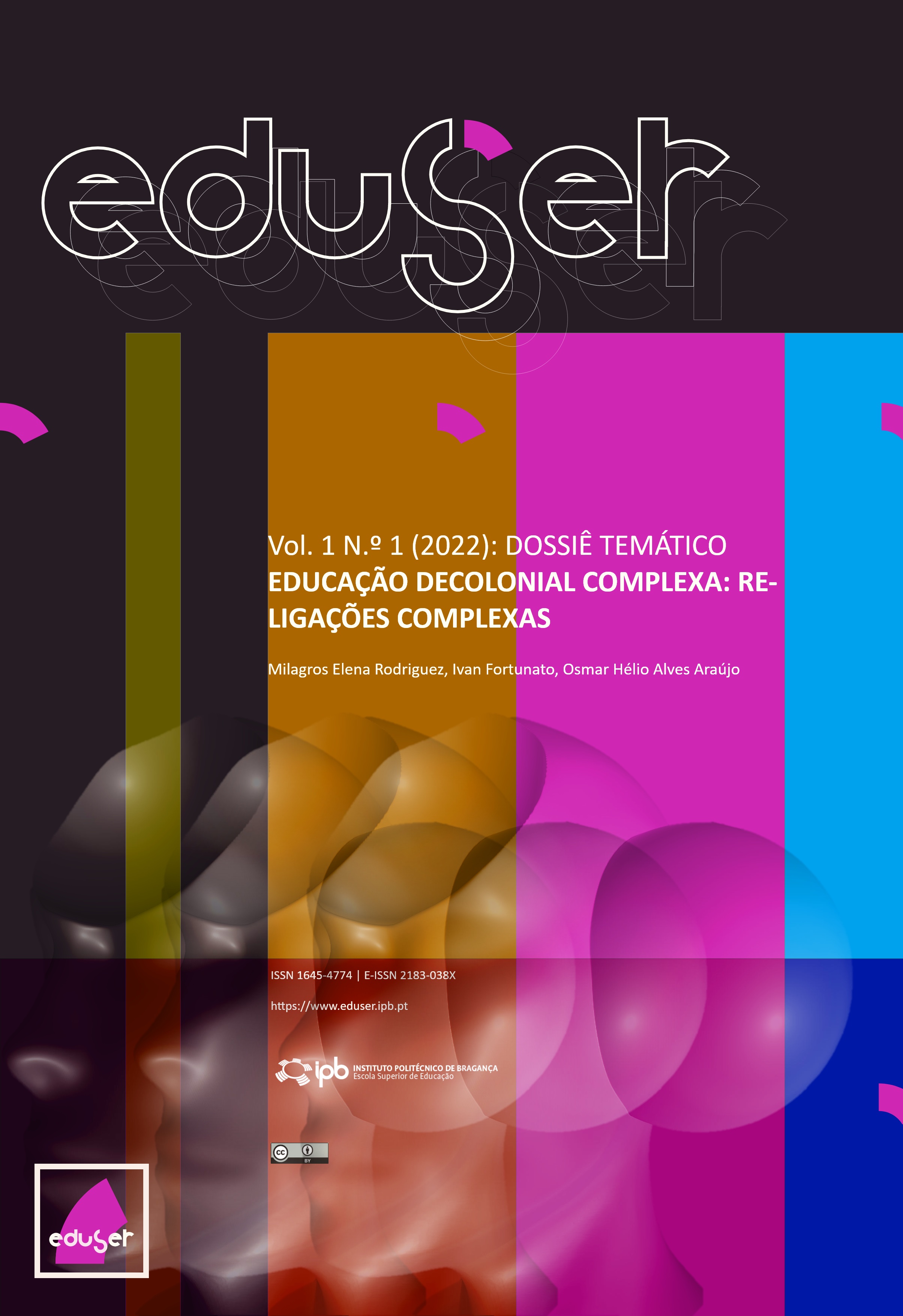Family and education: notes for a systemic understanding from the complexity paradigm of Edgar Morin
Main Article Content
Abstract
This work approaches the understanding of the family and education as complex systems in mutuality and interdependence based on the contributions of the complexity theory and the complex thought of Edgar Morin. It was found that the family-education system constitutes a self-reflexive loop that allows the interpretation of its systemic complexity by various routes and at the same time reveals it as a closed system to preserve the identity of its internal operations, but open to reorganization through through the integration-absorption of the emerging chaos both from the environment that fosters inter-systemic relationships and exchange, as well as from internal movements and transformations. This system combines autos and Oikos, which guarantees their self-organization, in addition to the computation and cogitation functions and the trinitarian relationships between individual-society-species; chaos—order—organization; brain—culture—spirit; reason-affectivity-drive. Integrating these elements allows a broader view of its complexity, in contrast to the influence of multiple explanatory perspectives, almost always insular and mono paradigmatic. The complexity and the complex thought question the disciplinary and fragmentary analysis for the sake of a dialogical understanding and in the context of the family-education system, which detaches the knowledge around said field from the linear mold that characterizes the analytical and reductionist coloniality ascribed to conceptualization and calculation.
Downloads
Article Details

This work is licensed under a Creative Commons Attribution 4.0 International License.
References
Andrade, J. A. (2018). Antropoética y conflicto: anotaciones acerca del malestar en torno a la violencia y lo violento. In R. S. Pérez & M. Á. Z. Carboney (Eds.), Las formas de violencia en América Latina contemporánea (pp. 85–111). Elaleph.com S.R.L.
Andrade, J. A. (2020a). La resistencia social como resistencia compleja– termodinámica: Acercamientos desde la complejidad y la termodinámica Social Resistance as Complex thermodynamic Resistance : Approaches from Complexity and thermodynamics. Revista Kavilando, 12(1), 2344–7125.
Andrade, J. A. (2020b). The brain in light of Edgar Morin’s paradigm of complexity. Archivos de Medicina, 20(1), 226–241. https://doi.org/https://doi.org/10.30554/archmed.20.1.3485.2020
Andrade, J. A., Leguizamo, D., & Vergara, A. (2018). Educación para la resistencia, una aproximación desde la complejidad. Kavilando, 9(2), 495–508. https://search.ebscohost.com/login.aspx?direct=true&db=sih&AN=136702751&site=ehost–live
Andrade, J. A., & Lisandro, C. (2021). Educación para la resistencia, perspectivas desde la complejidad y la pedagogía crítica. Revista Diálogo Interdisciplinario Sobre Educación Facultad Multidisciplinaria de Occidente, 3(1), 37–50. https://revistas.ues.edu.sv/index.php/redised/article/view/2316/2295
Bertalanffy, L. von. (1976). Teoría general de los sistemas. Fundamentos, desarrollo, aplicaciones. Fondo de Cultura Económica.
Cadenas, H. (2015). La familia como sistema social: Conyugalidad y parentalidad. Revista Mad. Revista Del Magíster En Análisis Sistémico Aplicado a La Sociedad, 33, 29–41. https://www.redalyc.org/pdf/3112/311241654004.pdf
Castañeda, J. (2000). Edgar Morin: “El siglo del conocimiento puede ser el siglo de la ceguera.” In Reportajes. http://www.porticoluna.org/reportajes/report/morin.html
de Sousa Santos, B. (2004). Espacios decoloniales. Conferencia Dictada En Universidad Nacional de Río Cuarto. Acto de Apertura. https://www.youtube.com/watch?v=WVtMzklvr7c
de Sousa Santos, B. (2007). De lo postmoderno a lo postcolonial y más allá de lo uno y de lo otro. In O. Kozlarek (Ed.), De la teoría crítica a una crítica plural de la modernidad (pp. 79–105). Editorial Biblos.
Delgado, C. (2007). Hacia un nuevo saber. La Bioética en la revolución contemporánea del saber (Universidad El Bosque, Ed.; Colección). Editorial Acuario.
Delgado, C. (2010). Diálogo de saberes para una reforma del pensamiento y la enseñanza en América Latina: Morin, Potter, Freire. Estudios: Filosofía, Historia, Letras, 8(93), 23. https://doi.org/10.5347/01856383.0093.000174747
Engels, F. (1909). The Origin of the Family, Private Property and the State. Charles H. Kerr & Co.
Lévi–Strauss, C. (1969). Las estructuras elementales del parentesco. Paidós.
Luhmann, N. (1990a). Glück und Unglück der Kommunikation in Familien: Zur Genese von Pathologien. In Soziologische Aufklärung, Band 5: Konstruktivistische Perspektiven (pp. 218–227). Westdeutscher Verlag.
Luhmann, N. (1990b). Sozialsystem Familie. In Soziologische Aufklärung, Band 5: Konstruktivistische Perspektiven (pp. 196–217). Westdeutscher Verlag.
Maio, N., Santos, H., & Loureiro, A. (2016). A supervisão: Funções e Competências do Supervisor. Eduser – Revista de Educação, 2(1), 37–51. https://doi.org/10.34620/eduser.v2i1.19
Maturana, H., & Varela, F. (1984). El árbol del conocimiento. Lumen.
Mignolo, W. (2010). Desobediencia epistémica: retórica de la modernidad, lógica de la colonialidad y gramática de la descolonialidad. Ediciones del Signo.
Minuchin, S. (2003). Familias y terapia familiar. Editorial Gedisa.
Morin, E. (1973). El paradigma perdido. Ensayo de bioantropología. Editorial Kairós.
Morin, E. (1977). El método I. La naturaleza de la naturaleza (6a edición). Editorial Cátedra. Colección Teorema Serie mayor.
Morin, E. (1998). Introducción al pensamiento complejo. Editorial Gedisa.
Morin, E. (1999). Los siete saberes necesarios para la educación a futuro. UNESCO. Organización de las naciones unidas para la educación, la ciencia y la cultura.
Morin, E. (2006). El Método VI. Ética. Editorial Cátedra.
Morin, E., & Delgado, C. (2016). Repensar la educación. Hacia una metamorfosis de la humanidad. Multiversidad Mundo Real Edgar Morin.
Morin, E., & Kern, A. B. (1993). Tierra Patria. Editorial Kairós.
Nicolescu, B. (1996). La transdisciplina. Manifiesto. Du Rocher.
Parsons, T. (1955). The American Family: Its Relations to Personality and to the Social Structure. In T. Parsons & R. Bales (Eds.), Family. Socialization and Interaction Process (pp. 3–33). The Free Press.
Prigogine, I. (1997). ¿Tan sólo una ilusión? Una exploración del orden al caos.
Prigogine, I. (1995). Ciencia y azar. Entrevista de Christian Delacampagne “Recherche” (1985). Zona Erógena, 23, 1–6. http://bd.unsl.edu.ar/download.php?id=437
Quijano, A. (2007). Coloniality and Modernity/Rationality. Cultural Studies , 21(3), 168–178.
Rodríguez, M. (2021). La decolonialidad planetaria como urgencia de la complejidad como transmetódica. PERSPECTIVAS METODOLÓGICAS , 21. https://doi.org/10.18294/pm.2021.3527
Satir, V. (1991). Family Therapy and Beyond. Science and Behavior Books.
Sotolongo, P. (2005). Complejidad, sociedad y vida cotidiana. COMPLEXUS Revista de Complejidad, Ciencia y Estética, 3(1), 22–31. https://www.sintesys.cl/assets/complexus3.pdf
Touraine, A. (1994). Las transformaciones del siglo XX.
Tyrell, H. (1979). Familie und gesellschaftliche Differenzierung. In H. Pross (Ed.), Familie– wohin? (pp. 13–77). Rowohlt.
von Foerster, H. (2006). Sobre sistemas autoorganizadores y sus ambientes. In Las semillas de la cibernética (Carlos E.). Editorial Gedisa.
Walsh, F. (1982). Conceptualization of normal family functioning. In Normal Family Process (pp. 3–44). Guillard Press.
